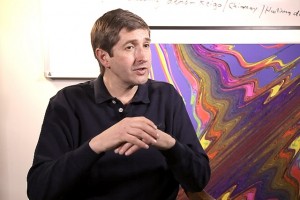Black Holes
Theoretical physicist Mahdi Godazgar on Einstein's equations, the event horizon, and spaghettification
Why was Newton unable to discover whether the Solar System is stable or not? What did scientists contribute to the study of the Solar System’s stability? What makes Jupiter’s orbit so unpredictable? Institute for Advanced Study Professor Scott Tremaine explains the conflict between Newton’s theology and his view on the motion of planets.
The question that Newton couldn’t figure out the answer to is over very long periods, over thousands of millions of orbits do these small periodic kicks in the orbit of the earth due to Jupiter, do they cancel outs or do they add up? That is if you follow the motion of the Earth for a very long time, does it gradually become more and more regular, say, more and more eccentric or do these periodic extra forces from Jupiter just cause periodic variations in the Earth’s orbit with the orbit’s staying more or less the same? He felt that the answer to this was that the Solar System was unstable. We believe he thought that the extra periodic gravitational forces from Jupiter would cause the orbit of the Earth to gradually become more and more eccentric until eventually it fell into the Sun or collided with another planet or was ejected into interstellar space.
The surprise that physicists had when they began to do long calculations of the Solar System is that it was chaotic, that is the orbits of the planets were chaotic. They found that if they made a small change in the position, say, of Jupiter when they started the calculation, eventually the difference between the original system and the changed system would start to grow exponentially. The strength of the chaos is measured by a quantity called the Lyapunov time, named after the Russian mathematician Lyapunov. It’s the time that it requires for the difference in the trajectories to grow by about a factor of three. For the Solar System it turned out that Lyapunov time was around 10 or 20 million years. This may seem like a long time but remember that the age of the solar system is thousands of millions of years. And this means that over the age of the Solar System the trajectories of the planets are simply not predictable.
The difficulty is in predicting exactly where Jupiter will be 100 million years from now rather than the overall shape of its orbit. But the chaos is there, it’s real, perhaps the most dramatic indication of the importance of the chaos is that if you decide to go to the theater instead of staying home one night the extra tidal force on Jupiter due to your decision from the motion of your body is sufficient to change the orbital position of Jupiter so that it’s completely unpredictable after a few hundred million years.

Theoretical physicist Mahdi Godazgar on Einstein's equations, the event horizon, and spaghettification

Physicist Ronald Walsworth on quantum mechanical transitions inside atoms, blue and red shift for GPS, and use...

Computer Scientist José Luis Vázquez-Poletti on the Mars MetNet Mission, using public cloud computing for spac...